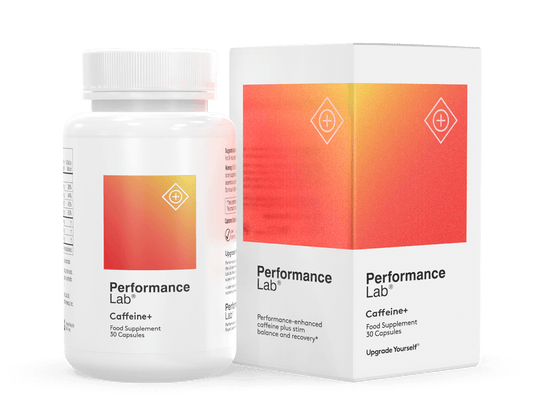What’s your go-to pre-workout? Many people would opt for a cup of coffee or a pre-workout powdered supplement. Though, have you ever thought about a pre-workout supplement that is solely the key ingredient of these products?
That’s precisely what caffeine anhydrous is - pure powdered caffeine!
There can be many side effects to pre-workout powders. Also, not everyone wants to drink lots of fluids before a workout, nor do they want the potential after-effects of coffee.
This is the reason there is a rise in the popularity of anhydrous caffeine - a more convenient and symptom-free alternative to your usual pre-workout products.
So, what is caffeine anhydrous? What are the benefits? Can it help you lose weight?
Read on to find out all you need to know about caffeine anhydrous!
What is Caffeine Anhydrous?
Caffeine anhydrous (without water) is the processed, dehydrated form of caffeine. It’s becoming an increasingly popular supplement among athletes and those with specific weight loss goals and is often the form of caffeine found in caffeinated chewing gum and energy bars.
Due to the process of creating anhydrous caffeine, it is a much more potent form of powdered caffeine, thus making it a much more efficient way to supplement caffeine.
How is Caffeine Anhydrous Created?
Caffeine is a natural substance found in plants such as coffee beans, tea, and cacao. Upon harvesting the seeds and leaves of the coffee plants, they go through a dehydration process that filters out water and other chemicals.
Hence the name “anhydrous”, meaning “without water”.
The product of this process is a concentrated caffeine powder, which is a very potent form of caffeine.
So, how does such a potent form of caffeine provide additional benefits as opposed to just regular caffeine?
Caffeine Anhydrous Benefits
Classified as a nootropic, caffeine is a powerful stimulant and one of the most used drugs on the globe.
Each day, millions, if not billions, of people consume caffeine in forms such as coffee or energy drinks to alleviate fatigue and improve concentration and focus.
While there are risks that come with caffeine consumption, there appear to be many benefits when consumed in moderation.
Some of the proposed benefits include:
Weight Loss
Caffeine may potentially suppress appetite and stimulate thermogenesis - quite frankly a pair of factors to be reckoned with when it comes to weight loss.
Reducing the desire to eat in combination with increased calorie burn is thought to be an effective strategy for weight loss, and some studies have suggested caffeine helps us do just that.
This is why many weight loss supplements on the market contain caffeine, as at the very least caffeine would result in more energy, thus more movement and more calories burnt - regarding caffeine a fairly staple ingredient in these products.
We will explore this in more detail soon!
Increased Alertness
Caffeine may increase alertness, which is probably the most obvious benefit of consuming caffeine.
It is thought that consumption of around 75mg can help increase attention, alertness, and wakefulness, with higher doses (up to 600mg) improving mental alertness, speed reasoning, and memory.
Boost Brain Function
Caffeine consumption is thought to improve brain function by affecting various brain pathways.
While the research is still in its youth, this can potentially result in enhanced thinking skills and the slowing down of age-related mental decline.
Improved Athletic Performance
Caffeine is one of the most highly researched sports supplements.
There is no denying that caffeine is recognized as one of the best ergogenic aids proven to increase endurance performance, endurance capacity, and reduce perceived exertion.
Additionally, studies have shown caffeine to improve muscular endurance and maximal strength, repeated sprint performance, and high-intensity training.
What Are the Specific Benefits of Caffeine Anhydrous?
While the above benefits stem from caffeine as a whole, you're probably wondering what the additional benefits of caffeine anhydrous are.
As we have established, caffeine anhydrous is a dehydrated form of caffeine. So, the product itself is a powdered form of caffeine, resulting in a more concentrated, potent form.
With this comes many additional benefits, particularly from a sports nutrition stand-point, such as:
No fluid
If you want the benefits of a pre-workout caffeine boost, but without the volume of fluid that normally comes with it (through drinking coffee or energy drinks), then opting for caffeine anhydrous in the form of pills would be a great alternative.
To read more on "Coffee vs Caffeine Pills", check out our linked guide!
This would reduce bathroom breaks during training or competition, and potentially ease any exercise-associated GI discomfort as a result - which brings us onto the next point!
Less GI side effects
Caffeine anhydrous wouldn't disrupt the GI tract as much as other forms of caffeine, such as coffee and energy drinks, mainly due to a lack of acidic compounds.
This is good news yet again for the exercising individuals among us who typically suffer from GI discomfort from caffeine intake (particularly coffee!), and are seeking improvements in athletic performance.
Easy to dose
One of the greatest benefits of caffeine anhydrous is the ability to dose much more accurately.
The problem with pre-workout powders, coffee, energy drinks, and any other fluid-based caffeine source, is the inaccuracy of the dose.
Caffeine pills, gum, or bars containing caffeine anhydrous would provide you with a concentrated, accurate dose due to the purity and potency.
This way, it makes it more simple to meet the recommended intake of caffeine for sports performance, or any other benefit you may be seeking.
Convenient
Not to mention the convenience of caffeine anhydrous. Carrying around your caffeine in the form of coffee, an energy drink, or big tubs (particularly athletes) can be inconvenient at the best of times.
Pills, chewing gum, or bars containing caffeine anhydrous are simply easier and more convenient forms of caffeine that don't require mixing or drinking.
Caffeine Anhydrous vs Caffeine: What are the Differences?
Caffeine anhydrous is created from the same plants as naturally occurring caffeine, so essentially, caffeine and caffeine anhydrous are the same thing.
The main difference between them is the process they go through to result in the final product.
Caffeine anhydrous goes through an additional process that involves filtering out the water and other chemical components, leaving behind pure powdered caffeine.
Caffeine anhydrous and caffeine also work the same way on the central nervous system too, both mimicking the neurotransmitter adenosine. This brain chemical is responsible for the tiredness and grogginess we feel upon waking or when we begin to flag later in the day.
This nervous system stimulant works to offset this effect by acting as an antagonist to adenosine, thus making us feel more awake for longer.
So, to further reiterate the above section to draw in the differences between caffeine and anhydrous caffeine, there are no major differences as to how this stimulant works in our body.
The only difference between them is simply the additional process anhydrous caffeine has to go through to make it anhydrous (without water), thus resulting in a more convenient, potent, and more concentrated form of caffeine.
What is the optimal dose of caffeine?
The recommended limit caffeine is currently 400mg per day at the time of writing, which appears to be a safe limit for most healthy adults.
However, studies have shown that doses of up to 3-6mg/kg body mass is an effective dose for improving sports performance.
This means that for an 80kg athlete, a dose 240-480mg would be the optimal dose if they are seeking performance improvements.
To put this into perspective, to achieve just 400mg of caffeine, you would need either 4 cups of coffee, 3 energy drinks, or 11.5 cans of coca-cola.
While according to the U.S. Food and Drug Administration (FDA), one teaspoon of caffeine powder is the equivalent of 28 cups of coffee.
This only reinforces the benefits of caffeine anhydrous as a quicker and more convenient source of caffeine, particularly for athletes who require higher doses in a short time frame in order to reap the performance-enhancing benefits.
Caffeine Anhydrous vs Caffeine Citrate: What are the Differences?
Caffeine citrate works in the same way as caffeine anhydrous or regular naturally occurring caffeine (blocking adenosine receptors in the brain).
However, caffeine citrate is a medication solely used to treat short-term breathing problems in premature infants.
Caffeine Anhydrous for Weight Loss: Does It Work?
While more research needs to be done on the effects of pure powdered caffeine anhydrous on weight loss, this doesn't stop weight loss products from including it as a key ingredient.
There has been some promising research so far on the potential appetite suppressing and thermogenic effect of caffeine, which is thought to be two factors heavily involved in body weight management.
Looking at it from a more indirect perspective, you could also assume that due to caffeine having a positive effect on alertness and wakefulness, this may result in a knock-on effect of physical movement.
Feeling less tired means you may be more physically active, or more alert and motivated when doing exercise. This then has a further impact on calorie burn, thus increasing your chances of weight loss.
The Effects of Caffeine Intake on Weight Loss
To summarize this point, there does not appear to be any robust research to support caffeine intake affecting weight loss.
However, for a healthy, active adult, there is no harm in experimenting with caffeine to gauge the effects on the individual.
Additionally, if increased caffeine intake results in more energy, thus more movement, this is also a positive effect from a calorie-burning viewpoint and should be considered on an individual basis.
Caffeine Anhydrous Side Effects
Caffeine dosages should ideally be tailored to the individual. Everyone has a different tolerance to caffeine, and this should be gauged prior to heavy caffeine consumption.
If you are new to consuming any source of caffeine or caffeine supplements, you should trial and error the dose, starting with a low dose, and see what works for you.
Some individuals have built up a caffeine tolerance over time, meaning they may not reap some of the proposed health and performance advantages that come with moderate caffeine intake.
When it comes to side effects, there has been some research that has highlighted the potential risk associated with very high caffeine intake, such as:
- Worse symptoms of anxiety and depression
- Triggering of gout attacks
- Incontinence
- Insomnia
- Headaches
- Dehydration
- Shakes and jitters
- High blood pressure
- Heartburn
However, this is largely dependent on individual intolerance and health status and is normally because of too-high caffeine intake.
Caffeine Anhydrous: Take-Home Message
There are many benefits associated with moderate caffeine intake, and additional benefits (particularly for athletes) of caffeine anhydrous.
Caffeine pills are proven to be a great addition to many athletes' supplement stack.
Caffeine anhydrous is a more potent, concentrated form of caffeine proven to have many health and performance benefits when consumed in moderation.
Weight loss is a potential benefit to consuming caffeine anhydrous, though the research is still in its youth and a concrete conclusion is yet to be determined.
However, there is more concrete evidence for the use of caffeine anhydrous for improving athletic performance, increasing wakefulness, and improving overall alertness and concentration.
It is important to remember that it is easy to caffeine overdose on pure powdered caffeine due to its potency, so always follow the dosage guidelines on your product and do not exceed the 400mg recommended daily limit of caffeine.
Individual tolerances to caffeine vary, so gauge your personal tolerance to caffeine and caffeinated supplements to avoid any risks of side effects of caffeine intoxication.
Caffeine Anhydrous: FAQs
Q: How many cups of coffee is 300mg of caffeine anhydrous?
A: Interestingly, according to the USDA, there is 94.8mg of caffeine per 1 cup (8 fl oz) of coffee.
This means you would have to drink at least 3 cups of coffee to get just short of 300mg of caffeine.
Q: Can you have a caffeine overdose?
A: An individual is unlikely to die from a caffeine overdose, especially from sources such as coffee. However, it is possible to overdose if you are consuming a pure caffeine powdered supplement.
Due to this form of caffeine being so potent and concentrated, it is very easy to overdose.
It’s not highly recommended to consume caffeine in powdered form unless it is in pill or gum form, where you can accurately follow dosage guidelines and reduce the risk of taking too much.
Q: How much caffeine anhydrous should I take?
A: It is safe to consume doses of caffeine up to 400mg per day. For athletes seeking performance improvements, it’s recommended to take more depending on their body weight.
Doses should be determined on an individual basis, as everyone has a different tolerance and caffeine limit.
Follow the dosage instructions on your product and do not exceed the recommended daily limit of caffeine, as too much caffeine may lead to adverse effects.
Q: How long does caffeine anhydrous stay in your system?
A: Caffeine anhydrous reaches peak level in your blood within 30 to 60 minutes.
It has a half-life (the time it takes for your body to eliminate half of a drug) of 3 to 5 hours.
Q: Is caffeine anhydrous bad for you?
A: Caffeine anhydrous is not bad for you in moderate doses, provided you stick to the recommended daily limit of caffeine and gauge your own individual tolerance.
The FDA advises people to avoid powdered caffeine due to the growing incidence of caffeine intoxication.















